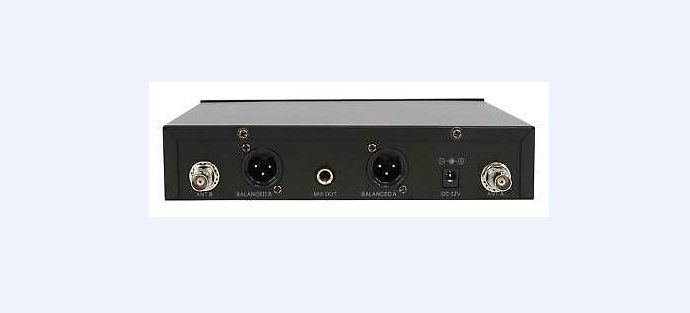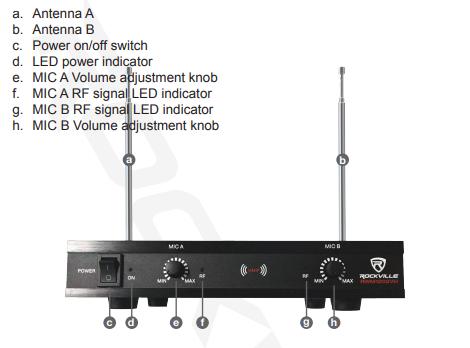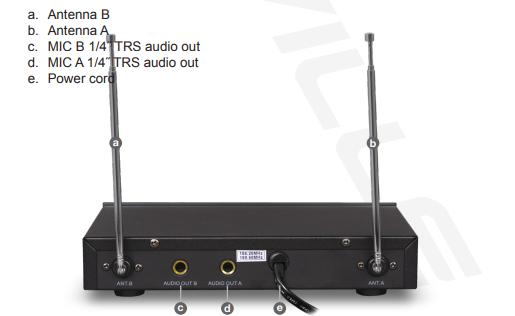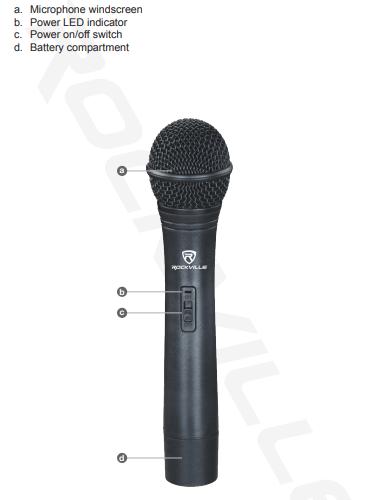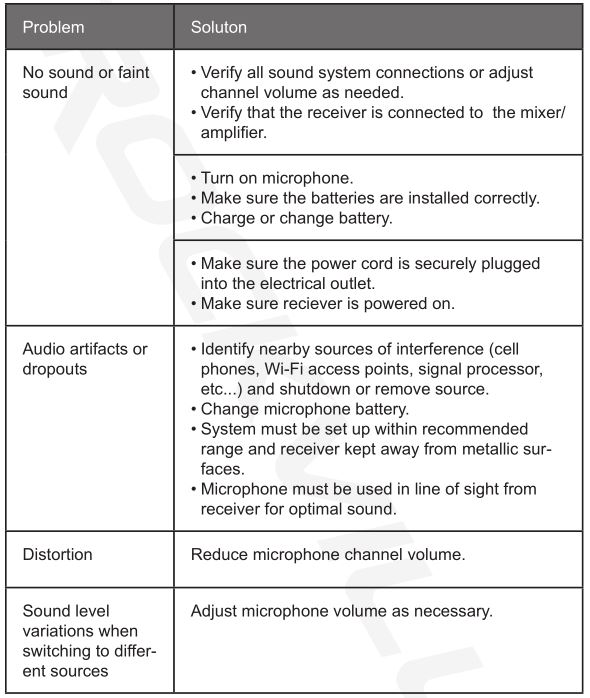ROCKVILLE WIRELESS MICROPHONE SYSTEM Owner's Manual
OWNER’S MANUAL
RWM1202VH V2HIGH PERFORMANCE WIRELESS MICROPHONE SYSTEM

Who reads manuals?Instead, go to vimeo.com/494444603 or scan the QR code and watch a short video, which shows you how toset this item up and how to use it.
Thank you for purchasing this Rockville RWM1202VH v2 Wireless Microphone System. Please read this owner’s manual carefully for proper use of your Rockville Wireless Microphone System. Should you need technical assistance please call our technical help line at 1-646-758-0144, Monday through Thursday, 9am to 10pm EST., and Fridays, 9am to 3pm EST.
Specs
FEATURES
- High performance wireless hand held microphone system
- Includes transmitter with (2) hand held microphones
- High sensitivity, unidirectional, wireless cardioid microphones
- Featuring a dual filter design to limit feedback and interference
- Ultra signal stability eliminates unwanted distortion
- Transmitter automatically links to receiver for ease of use
- Individual microphone volume controls
- Rugged metal housing
- Durable composite microphone construction
- Comfortable ergonomic design
- Low power consumption for longer battery life
SPECIFICATIONS
SYSTEM
Operating Range: 100´ – 200´(indoor), 65´ – 165´(outdoor)*Audio Frequency Response: 80 – 12KHzDynamic Range: ≥110dBSignal-to-Noise Ratio: ≥60dBOperating Temperature: 14°F – 122°FCarrier Frequency Range: 170 – 260MHz
RECEIVER
Sensitivity: (S/N = 30dB) >2mVDe-Emphasis: 50µSAudio Output Impedance: 600ΩAudio Output Level.: 0 – 0.5VPower Supply: AC110 /220V 56/60HzCurrent Consumption: ≤50mAAudio Out Connector: 2x ¼˝ unbalanced, 1x ¼˝ balanced
TRANSMITTER
Frequency Stability: ±0.005%RF Output Power: ≤30mWModulation Mode: VHFMaximum Deviation Range: ±50KHzMicrophone Mode: FixedPre-Emphasis: 50µSPower Supply: AA /1.5V×2Current Consumption: ≤35mA
*Operating range is subject to environmental conditions. Results may vary.
Receiver (Front)
Receiver (Back)
Microphones
Setup and Operation
For best performance of the wireless microphone system you should make sure that you run the cable from the receiver output (¼ output) into a microphone input on a powered speaker or mixing board. If you run it right into a line level input then the audio volume level output of the microphone(s) will drop significantly. Most mixers and powered speakers have both a Microphone input and a line level input.
- The reciever should be placed in an area that is stable and least likely to shake the unit.
- The receiver should be at least 3´ off the ground for optimal transmission.
- Connect the antenna, balanced cable AF line, and power supply provided.
- The antenna should extend vertically.
- Switch on the reciever.
- While the receiver is in stand-by, switch on the microphones.
- Adjust volume as necessary.

Troubleshooting
FEDERAL COMMUNICATIONS COMMISSION COMPLIANCE INFORMATION
Responsible party name: RockvilleAddress: 600 Bayview Ave,Entrance A,Inwood, NY 11096
Hereby declares that the product Rockville RWM1202VH V2 VHF microphone kit complies with FCC rules as mentioned in the following paragraph:
This device complies with Part 15 of the FCC rules. Operation is subject to the followingtwo conditions: (1) this device may not cause harmful interference, and (2) this devicemust accept any interference received, including interference that may cause undesired operation.Note: This equipment has been tested and found to comply with the limits for a Class B digitaldevice, pursuant to Part 15 of the FCC rules. These limits are designed to provide reasonableprotection against harmful interference in a residential installation. This equipment generates,uses and can radiate radio frequency energy and, if not installed and used in accordance withthe instructions, may cause harmful interference to radio communications. However, there is noguarantee that interference will not occur in a particular installation. If this equipment does causeharmful interference to radio or television reception, which can be determined by turning theequipment off and on, the user is encouraged to try to correct the interference by one or more ofthe following measures:
• Reorient or relocate the receiving antenna.• Increase the separation between the equipment and receiver.• Connect the equipment to an outlet on a circuit different from that to which the receiver is connected.• Consult the dealer or an experienced radio/TV technician for help.
 RockvilleAudio.com© 2021 ROCKVILLE // Features and specifications are subject to change and/or improvement without notice
RockvilleAudio.com© 2021 ROCKVILLE // Features and specifications are subject to change and/or improvement without notice
References
[xyz-ips snippet=”download-snippet”]

